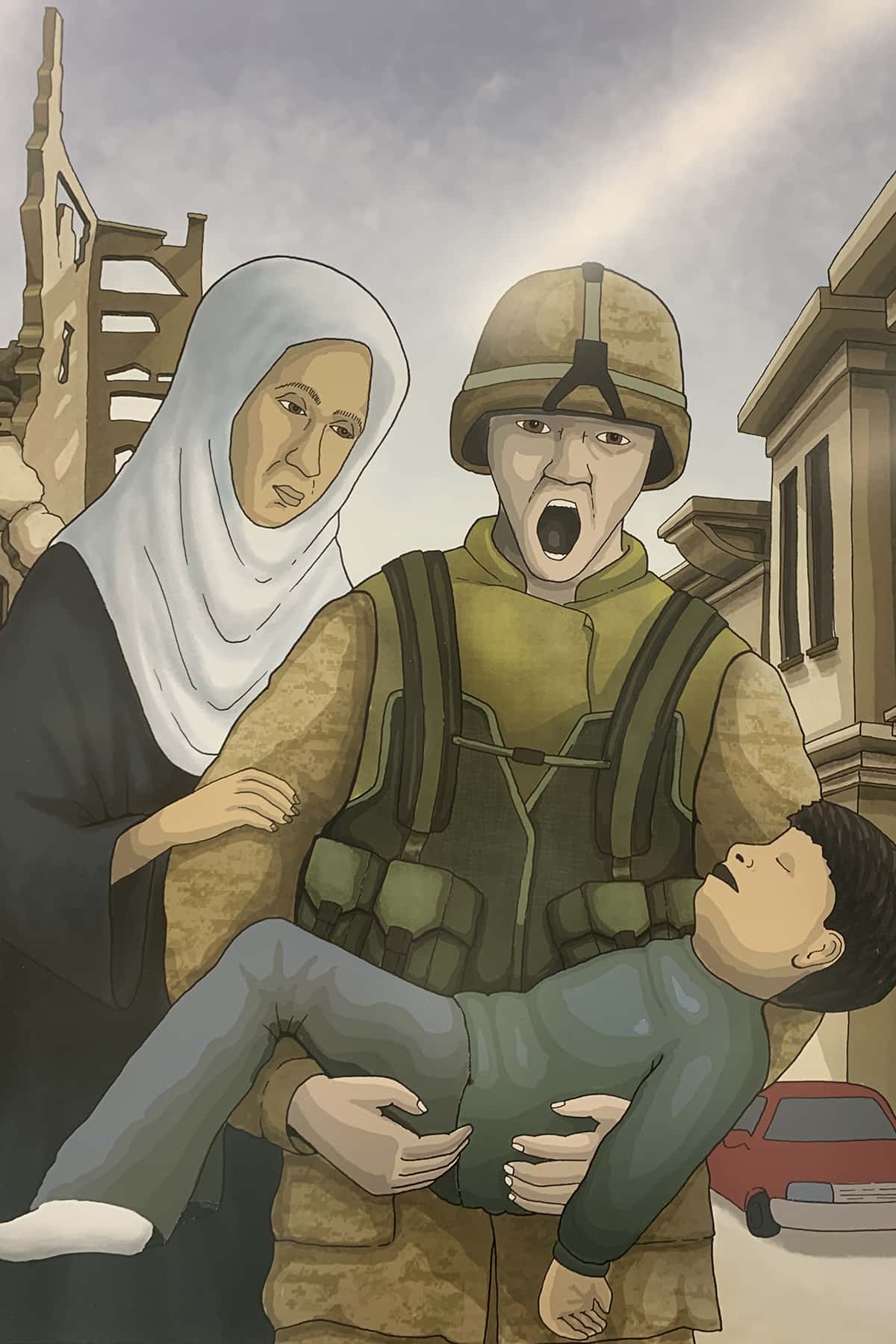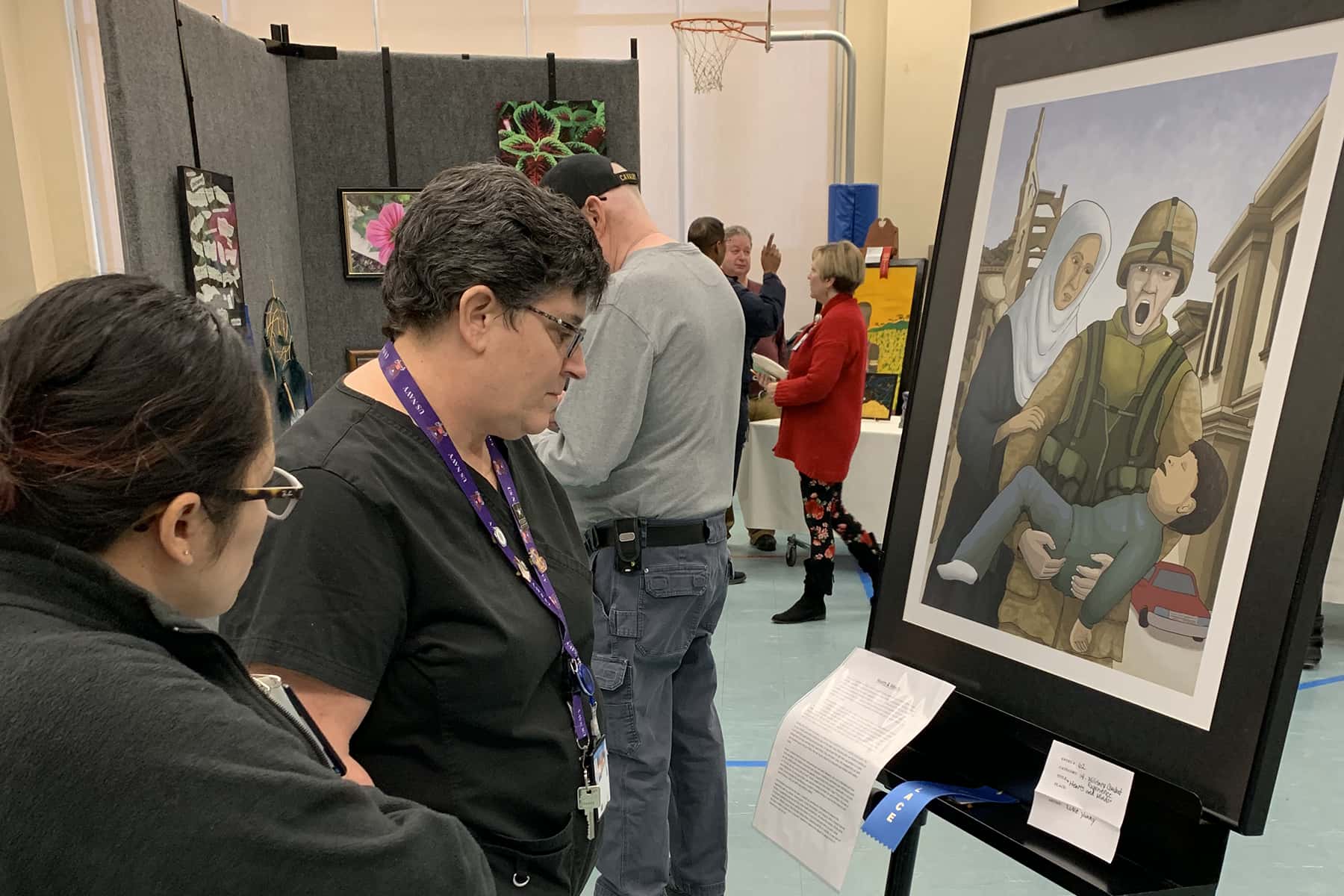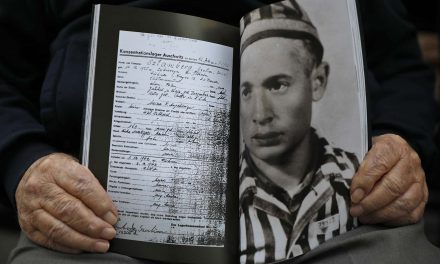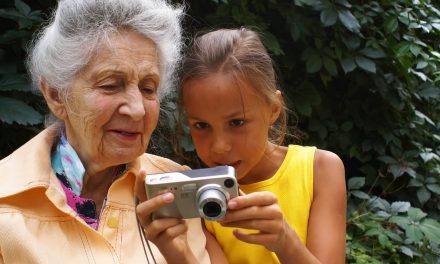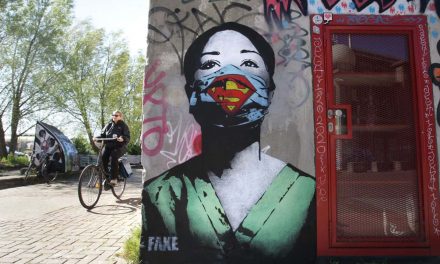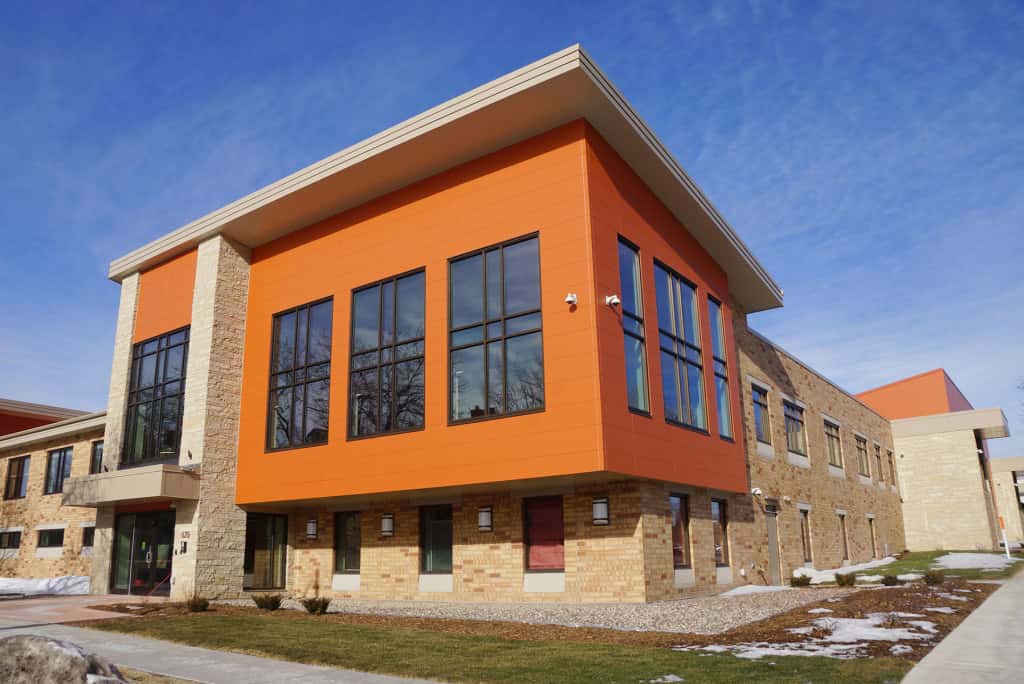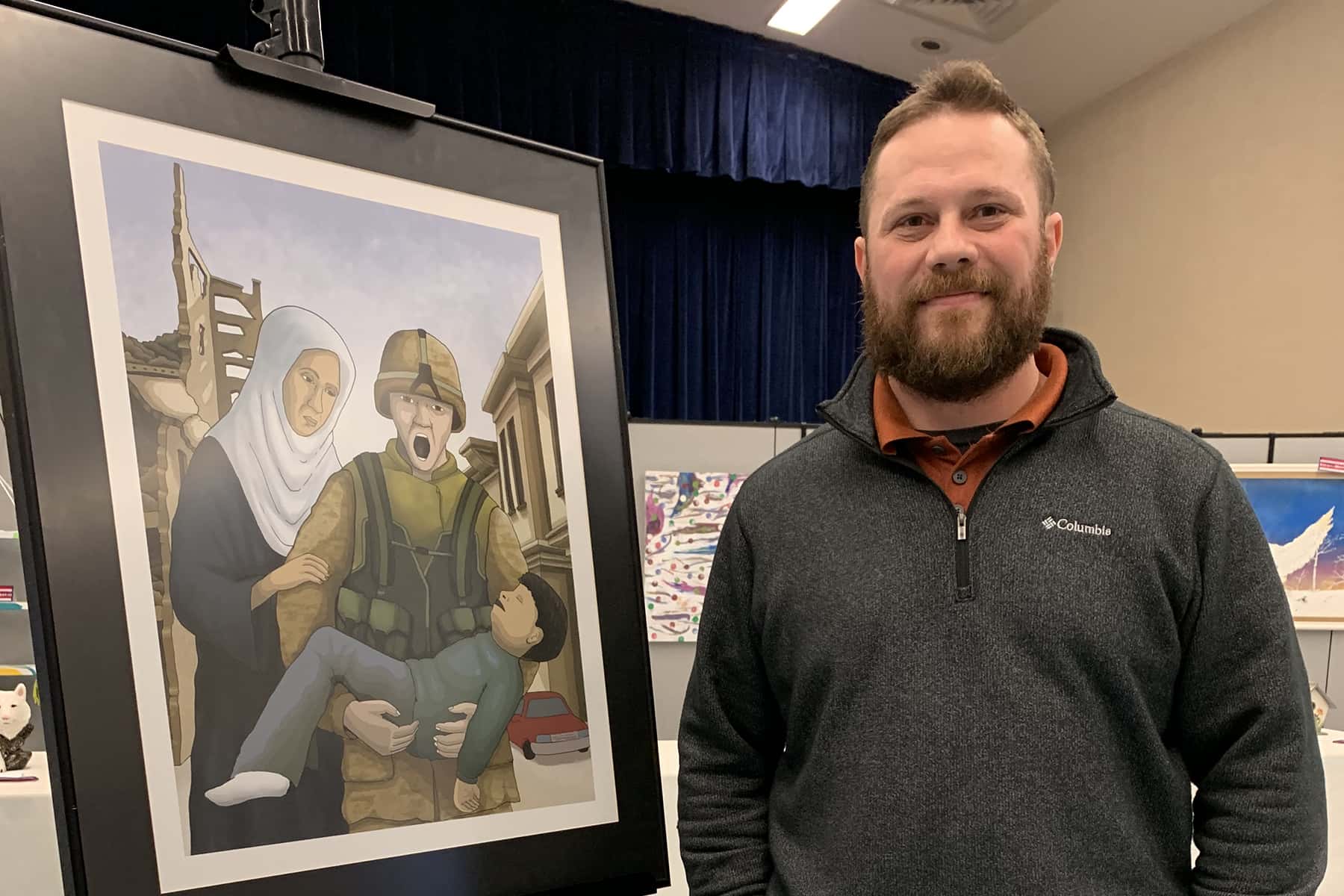
Luke Yanny left Iraq War behind in 2004 and came home to Milwaukee, but he brought the trauma of the battlefield with him. His father was the first to understand that something was not right with his son.
“He’s the one who hauled me in here to VA to get help,” Yanny said. “Also got hauled in by the police for a ‘drunk and disorderly,’ and spent some time as an inpatient,” Yanny said. “I came home and I was a mess. I was a huge mess for a good year and a half.”
When he closed his eyes, he lived the war – the firefights, the explosions and the death. Yanny poured his pain into a series of military portraits, one of which he entered in this year’s local creative arts festival in the Military Experiences category.
“Hearts & Minds,” a stark portrait of a screaming Marine holding a dead child he just shot, while the child’s mother comforts the Marine, won best of show at the Milwaukee VA Medical Center’s festival, getting the most votes from visitors on opening day. If the drawing wins at the next level, Yanny and his artwork could be invited to the National Veterans Creative Arts Festival, this October in Kalamazoo, Michigan.
Joining the Marines
The soft-spoken Yanny woke up one day at 19 and wanted a change.
“I was getting in trouble and kind of stagnant in life. Always had an idea of joining the military, and one day just woke up and said, ‘I’m gonna do it.’ Two weeks later I was in boot camp. My mom was not loving the idea. The recruiter had to listen to her storm in and ask all kinds of questions.”
Soon after, he was in Iraq for the invasion in 2003 and sent back when the Marines retook Fallujah in 2004.
“I was going to re-enlist immediately, but then three of my buddies were killed. My team got blown up,” he said. “I called my dad and told him I was going to re-enlist and he talked me out of it. He told me not to do anything irrational.”
His award-winning drawing focuses on that time in Iraq.
In the description for “Hearts & Minds,” he wrote, “I have a very personal connection to this piece because during my time in Iraq the insurgence used the civilian population as pawns in the war on Hearts and Minds. They used women and children as human shields. Blew up schools and hospitals we were trying to build for the people of Iraq.”
Hearts & Minds
This is 1 of 7 illustrations I did as a series about my war experiences while serving in Iraq in 2003 through 2004. I have a very personal connection to this piece because during my time in Iraq the insurgents used the civilian population as pawns in the war on Hearts and Minds. They used women and children as human shields. Blew up schools and hospitals we were trying to build for the people of Iraq. The targeting of these facilities got so bad at times the Marines would be sent to guard these buildings and travel routes during the day so people could get to and from them safely.
One experience that still sticks with me to this day happened in the very early phase of the Iraq war. It was within the first 6 weeks of the invasion and the insurgency started using car bombs to attach US Military check points. This happened almost overnight all over the country and as a result Marines got more on edge when working vehicle check points on the roads. To try to deter Iraqi civilians from getting hurt at the check points and also looking out for the safety of the Marines. The Marine Corps ordered that we have signs put out 100 yards from each check point warning cars to stop immediately to be searched, if they don’t stop warning shots will be fired and then followed with deadly force.
Shortly after this order was given, my platoon was ordered to set up a vehicle check point. We set up a check point and a defensive line on the main road. Minutes after we finished setting up a car came fast approaching on our position. It zipped past the sign that was written in Arabic telling them to stop, warning shots were fired. They still didn’t stop. We engaged the car with two machine guns and our M16s. The car slowly rolled to a stop and was riddled with bullets holes.
It was a miracle that the driver and passenger survived. However, the son in the back seat was shot and killed. We tried to revive him and ordered a medevac, but there was nothing we could do. We all felt awful and consoled the parents. Surprisingly they weren’t upset with us and told us, “it’s ok, we are used to this in Iraq”. When asked why they didn’t stop? They told us they were fleeing the city because of the war and the brakes on their car were broken. This was a really surreal moment for me because I couldn’t imagine being so used to the violence and death that you were ok with your child be killed.
This moment haunted me for years. I ended up creating this illustration to express this experience with my civilian counterparts. In this illustration I am trying to show a frantic Marine trying to scream for help and get the child medical attention. All while the mother of this child is trying to comfort this Marine and let him know it’s not his fault and she is ok with what happened. Which is what I felt she was doing when I experienced this in real life. It was one of the hard realities of daily life in Iraq and I wanted to express this aspect to people here in America through my art.
As a vehicle raced through a checkpoint without stopping, the Marines opened fire. The driver and passenger survived, but a child in the backseat was killed.
The child’s mother said they didn’t stop because they were trying to escape the war, yet they were so used to death, she tried giving solace to the Marine.
“It was so hard because the insurgents were holding them at gunpoint, and then using them as human shields and forcing us to shoot,” Yanny said. “But you can’t process it when you are there. You just go numb. At that moment, you have to turn it off. At one point, we could be at a checkpoint and we’re shooting and getting shot at, then 20 minutes later you get a call that your moving out. You can’t process the war when you’re in the war.”
Coming home and the painting
“Three weeks after I was walking the streets of Al Qaim, I’m walking the streets of Milwaukee. My parents picked me up, and as we’re riding down the road, I’m scanning rooftops and bridges to see if someone was going to drop a hand grenade,” Yanny said. “I felt old when I came home. I came home at 23 and felt like a really old, 40-year-old man.”
Yanny said he was grateful for his father, the police and VA for helping him get better.
“I had a buddy I worked with from Vietnam and knew he was going to have trouble coming back,” said his father, Mark Yanny. “It was his mom and me. I knew with post-traumatic stress it would be hard to talk about, so I would talk about the physical stuff – his back, and ankle and knees. I hoped if he went in for that, he could get help for the mental health stuff, too. The Marines are good at making them tough, teaching them to survive, but they don’t teach them how to turn it off. Luke underestimates himself. He’s pretty smart and doesn’t give himself as much credit. He wanted to get better.”
Yanny went back to school and eventually was accepted into The Milwaukee Institute of Art and Design.
“That gave me a lot of focus,” said Yanny, who has worked as a graphic designer at the Milwaukee VA since 2017. “They gave us a lot of freedom to work on our own projects, and I researched post-traumatic stress disorder. It kind of was my therapy. I read Dave Grossman’s book, ‘On Killing.’ It helped me understand who I was and where I was. I did a lot of writing. My school thesis was all about the war experiences and how those experiences affected me.”
Yanny produced “Hearts & Minds” as part of a series of seven ink paintings at that time. Kris Kulas, a Milwaukee VA art therapist, said of all this year’s work, it evoked the strongest reaction.
“There wasn’t a dry eye from anyone looking at his work. I should have put a box of Kleenex with it,” Kulas said.
Yanny completed the series of war drawings in 2011. There are still days where a loud noise or quick movement will make him jump, but he has learned to work through it. And through it all, he still has fond memories of his days as a Marine.
“Then I stepped away. I was having a hard time and was burned out mentally. Three years ago, I started painting again, but not war. I’ve come to terms with this and the bad things. I do outdoorsy stuff now. I’d do it all over again,” Yanny added. “The VA helped me and the Marines helped me. It gave me a purpose, the bonding, and I’m still best friends with some of these guys to this day.”
Gary J. Kunich
Milwaukee VA

